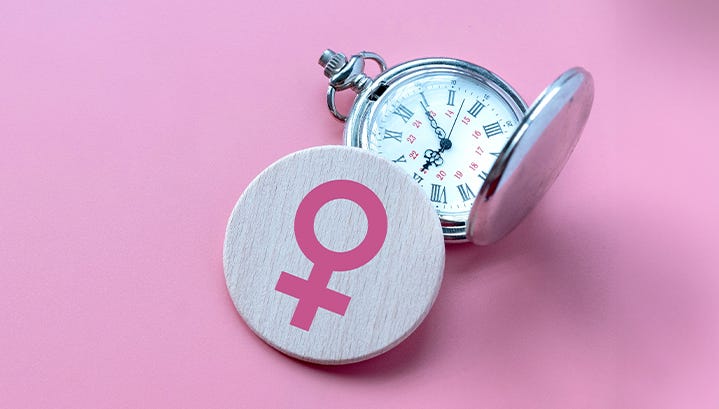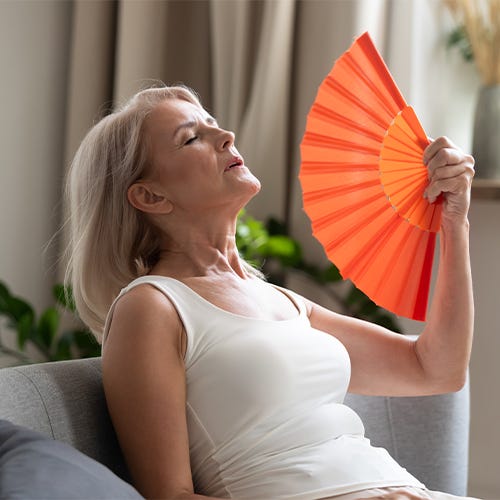Empty cart?
We can only assume that's because you haven't seen our latest offers
Sensilab uses cookies for their websites, which does not store personal data. Some cookies might already be installed. By proceeding to use this website you consent to the cookie usage.
Contact us online
100% satisfaction guarantee
Free delivery above €50
Contact us
info@sensilab.ieMenopause, from the Greek words “men” and “pausis, “meaning “monthly” and “end,” signifies the natural conclusion of a woman’s monthly menstrual cycle, specifically when you’ve been without a period for 12 consecutive months. It’s a normal phase in life that all women will go through following perimenopause, a period when periods gradually cease due to decreased ovarian activity.
Despite its seemingly simple nature, menopause isn’t a one-day event but a transition that spans months or years. This transition involves various physical and psychological symptoms that can persist for years after menstruation stops.
While not an illness, menopause can significantly impact life. Taking proactive steps is crucial, as symptoms can lead 10% of women to leave their jobs, with one in four contemplating quitting. Each woman’s experience is unique, so there’s no universal solution. However, staying informed about the latest research can empower you to understand, cope with, and seek practical help for the challenges of menopause.

Menopause typically occurs between ages 45 and 55. 5% of women experience it after the age of 55 (late-onset menopause), and 1 in 100 face premature menopause that occurs before the age of 40.
Early menopause occurs when menstruation ceases before the age of 45, which can be attributed to various factors, including cancer treatments, hysterectomy, certain autoimmune diseases, infections, or natural causes.
Precisely predicting the onset of menopause is challenging, but research indicates several influencing factors:
Research also suggests that women of African, Asian, and Latino descent are generally more likely to start menopause earlier than white women, experiencing a more extended transition time into menopause with potentially more severe symptoms.
You can recognise that you’re in menopause when you’ve been experiencing its symptoms, and it has been 12 consecutive months since your last menstrual period. This 12-month stage without a period confirms the transition into menopause. Symptoms can include hot flashes, night sweats, changes in mood, and other signs associated with hormonal shifts.
If you’re uncertain or experiencing discomfort, consulting with a healthcare professional can provide confirmation and guidance.
As menopause approaches, your ovaries slow down, reducing the production of hormones like oestrogen, progesterone, and testosterone. These hormones impact not only your reproductive cycle but also sleep, weight, energy levels, temperature regulation, skin, soft tissues, and mood. Fluctuating testosterone levels can affect your sex drive.
To understand your hormones better during this time, a test measuring follicle-stimulating hormone (FSH) can provide insights. While a single FSH test may not definitively confirm menopause, consistently elevated levels around 30 lU/L, along with no periods for 12 months, likely indicate menopause.
Menopause symptoms are largely driven by lower levels of oestrogen, affecting both physical and psychological aspects. For instance, sleep issues, a common complaint during menopause, can lead to low energy, reduced motivation, and mood changes. Interconnected symptoms can contribute to a range of challenges, such as anxiety and stress.
About 75% of women experience menopause symptoms, with a quarter facing severe ones. Given the potential duration of around 7 to 15 years for some, it’s crucial to recognise, understand, and find ways to alleviate these symptoms, recognising that each woman’s experience will vary in terms of length, severity, and specific symptoms.
Here are the top 9 menopause symptoms:

The most impactful symptoms in menopause, however, often involve the vaginal area, including vaginal dryness and discomfort during sex. Reduced oestrogen levels affect urogenital tissues, leading to urogenital atrophy in the areas around the vagina, vulva, bladder, and urethra. This atrophy causes thinning and dryness of the tissues, resulting in vulval or vaginal dryness, soreness, and irritation. These symptoms, notably painful sex and bladder-related issues can persist, unlike other menopausal symptoms.
Additionally, lower oestrogen levels contribute to low libido, reducing the desire for intimacy and sex.
Understanding what factors worsen symptoms is crucial. The main triggers likely to intensify menopause symptoms for many women include:
Considering the diverse impact of menopause, exploring various treatment options is essential. Familiarising yourself with available choices empowers you to make informed decisions and equips you with practical tools to navigate your menopause more smoothly.
Navigating menopause can be a unique journey for every woman, as the experience varies in terms of symptoms, duration, and intensity. While menopause brings about natural changes in hormonal levels, it doesn’t mean you have to endure its symptoms without relief.
Managing menopause symptoms involves a combination of understanding, self-awareness, and informed decision-making. From lifestyle adjustments and stress management to exploring medical interventions and seeking emotional support, there are various approaches to help alleviate the challenges posed by menopause.
In this journey, knowledge becomes a powerful tool, enabling women to make informed choices tailored to their individual needs. Below are some strategies and insights on how to effectively manage menopause symptoms, empowering women to embrace this phase with resilience and well-being.

The primary medical treatment for menopause is hormone replacement therapy (HRT), considered statistically the most effective for relieving symptoms in healthy women. HRT, prescribed by your GP or available as vaginal oestrogen from pharmacists, replenishes depleted oestrogen and progesterone hormones.
It comes in various forms, such as tablets, patches, gels, implants, creams, or pessaries. Discussing risks and benefits with your GP is crucial to determine if HRT is the right option for you, especially if you need a menopause diagnosis, are considering HRT, are facing challenges with existing treatment, or want to understand its safe duration.
Regular exercise plays a crucial role in managing menopause symptoms. It boosts endorphin levels, alleviates anxiety and depression, maintains physical fitness, and supports healthy weight.
Exercise builds muscle mass, protects bones, enhances flexibility, reduces the risk of heart disease, improves sleep, and may even reduce the severity of hot flushes. Additionally, it increases blood flow to the brain, aids in reducing brain fog, and has been shown to improve self-worth and quality of life in postmenopausal women.
A balanced diet rich in nutrients, vitamins, and minerals significantly impacts energy levels and mental health during menopause. Reducing foods that induce lethargy and incorporating more protein and fibre can make a real difference in maintaining overall well-being.
Supplements containing natural phytoestrogens, which mimic oestrogen in the body, can help balance hormones during menopause. M-Pause, our completely natural and hormone-free supplement, offers gentle but effective support tailored to your unique menopause journey.
Tailored for both perimenopause and menopause, M-Pause harnesses the power of phytoestrogens derived from hop and red clover extracts. These plant-based compounds effectively balance oestrogen levels, addressing the discomfort commonly associated with this life stage.
Remarkably, studies have confirmed a 4*x reduction in hot flashes and a 2*x decrease in night sweats within just six weeks* of incorporating M-Pause into your routine.
Implementing small daily changes can lead to lasting results during menopause. Cognitive behavioural therapy exercises, guided imagery meditation for better sleep, pelvic training for sensitive bladders, and deep breathing exercises for stress and anxiety can contribute to overall well-being.
Discovering you’re going through menopause brings a mix of emotions. However, it’s worth reflecting on potential benefits, including:
*Disclaimer: the effects of the product may vary between individuals and could differ from those described on the website. Our products are not intended to prevent, treat or cure any disease or serious illness. Maintaining a balanced diet and a healthy lifestyle is important.
Products for you
Leaving already?
You’ve left [X] items in your cart.
We can’t guarantee the products will still be available when you return.
Check out now and get an EXTRA 10% OFF.
